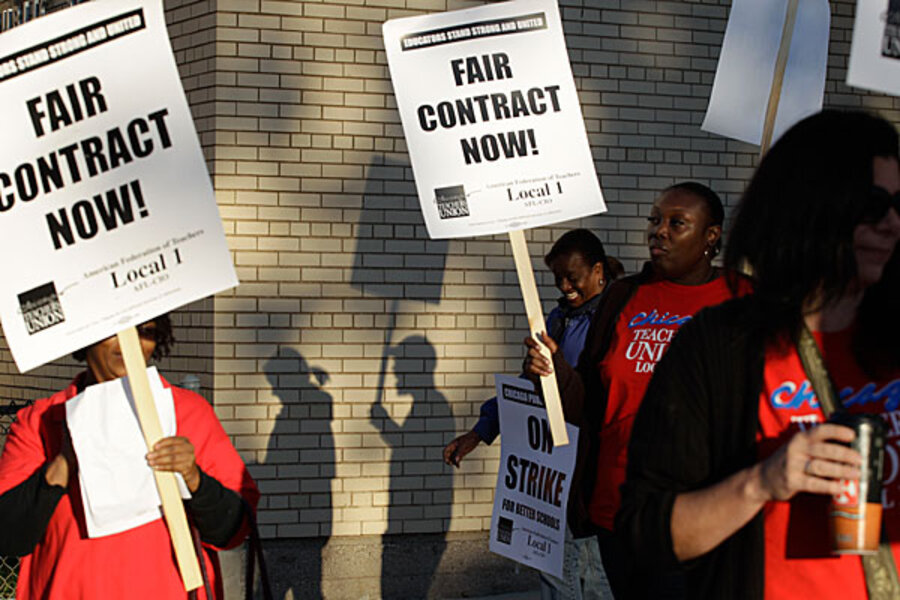Chicago strike: Teachers picket outside schools
Loading...
| Chicago
Thousands of teachers walked off the job Monday in Chicago's first schools strike in 25 years, after union leaders announced that months-long negotiations had failed to resolve a contract dispute with school district officials by a midnight deadline.
The walkout in the nation's third-largest school district posed a tricky challenge for the city and Mayor Rahm Emanuel, who said he would push to end the strike quickly as officials figure out how to keep nearly 400,000 children safe and occupied.
"This is not a strike I wanted," Emanuel said Sunday night, not long after the union announced the action. "It was a strike of choice ... it's unnecessary, it's avoidable and it's wrong."
RECOMMENDED: 10 books to read after the 'Hunger Games' triology
Some 26,000 teachers and support staff were expected to join the picket. Among teachers protesting Monday morning outside Benjamin Banneker Elementary School on Chicago's South Side, eighth-grade teacher Michael Williams said he wanted a quick contract resolution.
"We hoped that it wouldn't happen. We all want to get back to teaching," Williams said, adding that wages and classroom conditions need to be improved.
Contract negotiations between Chicago Public School officials and union leaders that stretched through the weekend were expected to resume Monday.
Officials said some 140 schools would be open between 8:30 a.m. and 12:30 p.m. so the children who rely on free meals provided by the school district can eat breakfast and lunch, school district officials said.
City officials acknowledged that children left unsupervised — especially in neighborhoods with a history of gang violence — might be at risk, but vowed to protect the students' safety.
"We will make sure our kids are safe, we will see our way through these issues and our kids will be back in the classroom where they belong," said Emanuel, President Barack Obama's former chief of staff.
The school district asked community organizations to provide additional programs for students, and a number of churches, libraries and other groups plan to offer day camps and other activities.
Police Chief Garry McCarthy said he would take officers off desk duty and deploy them to deal with any teachers' protests as well as the thousands of students who could be roaming the streets.
Union leaders and district officials were not far apart in their negotiations on compensation, Chicago Teachers Union President Karen Lewis said. But other issues — including potential changes to health benefits and a new teacher evaluation system based partly on students' standardized test scores — remained unresolved, she said.
"This is a difficult decision and one we hoped we could have avoided," Lewis said. "We must do things differently in this city if we are to provide our students with the education they so rightfully deserve."
Emanuel and the union officials have much at stake. Unions and collective bargaining by public employees have recently come under criticism in many parts of the country, and all sides are closely monitoring who might emerge with the upper hand in the Chicago dispute.
The timing also may be inopportune for Emanuel, whose city administration is wrestling with a spike in murders and shootings in some city neighborhoods and who just agreed to take a larger role in fundraising for Obama's re-election campaign.
As the strike deadline approached, parents spent Sunday worrying about how much their children's education might suffer and where their kids will go while they're at work.
"They're going to lose learning time," said Beatriz Fierro, whose daughter is in the fifth grade on the city's Southwest Side. "And if the whole afternoon they're going to be free, it's bad. Of course you're worried."
The school board was offering a fair and responsible contract that would most of the union's demands after "extraordinarily difficult" talks, board president David Vitale said. Emanuel said the district offered the teachers a 16 percent pay raise over four years, doubling an earlier offer.
Lewis said among the issues of concern was a new evaluation that she said would be unfair to teachers because it relied too heavily on students' standardized test scores and does not take into account external factors that affect performance, including poverty, violence and homelessness.
She said the evaluations could result in 6,000 teachers losing their jobs within two years. City officials disagreed and said the union has not explained how it reached that conclusion.
Emanuel said the evaluation would not count in the first year, as teachers and administrators worked out any kinks. Schools CEO Jean-Claude Brizard said the evaluation "was not developed to be a hammer," but to help teachers improve.
The strike is the latest flashpoint in a very public and often contentious battle between the mayor and the union.
When he took office last year, Emanuel inherited a school district facing a $700 million budget shortfall. Not long after, his administration rescinded 4 percent raises for teachers. He then asked the union to reopen its contract and accept 2 percent pay raises in exchange for lengthening the school day for students by 90 minutes. The union refused.
Emanuel, who promised a longer school day during his campaign, then attempted to go around the union by asking teachers at individual schools to waive the contract and add 90 minutes to the day. He halted the effort after being challenged by the union before the Illinois Educational Labor Relations Board.
The district and union agreed in July on how to implement the longer school day, striking a deal to hire back 477 teachers who had been laid off rather than pay regular teachers more to work longer hours. That raised hopes the contract dispute would be settled soon, but bargaining continued on the other issues.
RECOMMENDED: 10 books to read after the 'Hunger Games' triology
Copyright 2012 The Associated Press.







